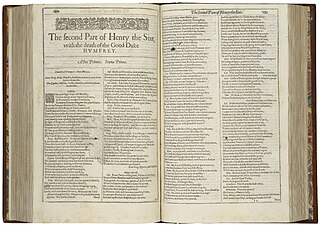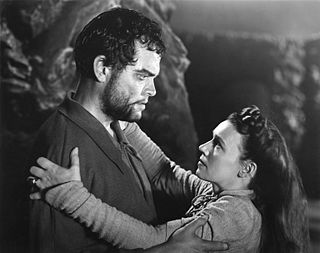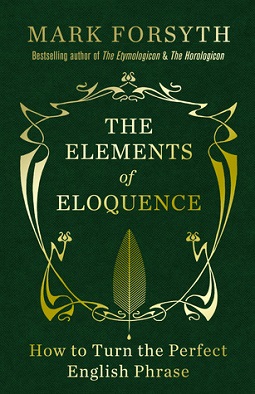Related Research Articles

Henry VI was King of England from 1422 to 1461 and again from 1470 to 1471, and disputed King of France from 1422 to 1453. The only child of Henry V, he succeeded to the English throne at the age of nine months upon his father's death, and succeeded to the French throne on the death of his maternal grandfather, Charles VI, shortly afterwards.

Henry VI, Part 1, often referred to as 1 Henry VI, is a history play by William Shakespeare—possibly in collaboration with Thomas Nashe and others—believed to have been written in 1591. It is set during the lifetime of King Henry VI of England.

Henry VI, Part 2 is a history play by William Shakespeare believed to have been written in 1591 and set during the lifetime of King Henry VI of England. Whereas Henry VI, Part 1 deals primarily with the loss of England's French territories and the political machinations leading up to the Wars of the Roses, and Henry VI, Part 3 deals with the horrors of that conflict, 2 Henry VI focuses on the King's inability to quell the bickering of his nobles, the death of his trusted adviser Humphrey, Duke of Gloucester, the rise of the Duke of York and the inevitability of armed conflict. As such, the play culminates with the opening battle of the War, the First Battle of St Albans (1455).

Henry VI, Part 3 is a history play by William Shakespeare believed to have been written in 1591 and set during the lifetime of King Henry VI of England. Whereas 1 Henry VI deals with the loss of England's French territories and the political machinations leading up to the Wars of the Roses and 2 Henry VI focuses on the King's inability to quell the bickering of his nobles, and the inevitability of armed conflict, 3 Henry VI deals primarily with the horrors of that conflict, with the once stable nation thrown into chaos and barbarism as families break down and moral codes are subverted in the pursuit of revenge and power.

In the First Folio, the plays of William Shakespeare were grouped into three categories: comedies, histories, and tragedies. The histories—along with those of contemporary Renaissance playwrights—help define the genre of history plays. The Shakespearean histories are biographies of English kings of the previous four centuries and include the standalones King John, Edward III and Henry VIII as well as a continuous sequence of eight plays. These last are considered to have been composed in two cycles. The so-called first tetralogy, apparently written in the early 1590s, covers the Wars of the Roses saga and includes Henry VI, Parts I, II & III and Richard III. The second tetralogy, finished in 1599 and including Richard II, Henry IV, Parts I & II and Henry V, is frequently called the Henriad after its protagonist Prince Hal, the future Henry V.

Jack Cade's Rebellion was a popular revolt in 1450 against the government of England, which took place in the south-east of the country between the months of April and July. It stemmed from local grievances regarding the corruption, maladministration and abuse of power of the king's closest advisors and local officials, as well as recent military losses in France during the Hundred Years' War. Leading an army of men from south-eastern England, the rebellion's leader Jack Cade marched on London in order to force the government to reform the administration and remove from power the "traitors" deemed responsible for bad governance. Apart from the Cornish rebellion of 1497, it was the largest popular uprising to take place in England during the 15th century.
Fleance is a figure in legendary Scottish history. He was depicted by 16th-century historians as the son of Lord Banquo, Thane of Lochaber, and the ancestor of the kings of the House of Stuart. Fleance is best known as a character in William Shakespeare's play Macbeth, in which the Three Witches prophesy that Banquo's descendants shall be kings. Some screen adaptations of the story expand on Fleance's role by showing his return to the kingdom after Macbeth's death.

Lord Macbeth, the Thane of Glamis and quickly the Thane of Cawdor, is the title character and main protagonist in William Shakespeare's Macbeth. The character is loosely based on the historical king Macbeth of Scotland and is derived largely from the account in Holinshed's Chronicles (1577), a compilation of British history.

"Get Over It" is a song by the Eagles released as a single after a fourteen-year breakup. It was also the first song written by bandmates Don Henley and Glenn Frey when the band reunited. "Get Over It" was played live for the first time during their Hell Freezes Over tour in 1994. It returned the band to the U.S. top 40 after a fourteen-year absence, peaking at No. 31 on the Billboard Hot 100 chart. It also hit No. 4 on the Billboard Mainstream Rock Tracks chart. The song was not played live by the Eagles after the Hell Freezes Over tour in 1994. It remains the group's last top 40 hit in the U.S.

The Wars of the Roses was a 1963 theatrical adaptation of William Shakespeare's first historical tetralogy, which deals with the conflict between the House of Lancaster and the House of York over the throne of England, a conflict known as the Wars of the Roses. The plays were adapted by John Barton, and directed by Barton and Peter Hall at the Royal Shakespeare Theatre. The production starred David Warner as Henry VI, Peggy Ashcroft as Margaret of Anjou, Donald Sinden as the Duke of York, Paul Hardwick as the Duke of Gloucester, Janet Suzman as Joan la Pucelle, Brewster Mason as the Earl of Warwick, Roy Dotrice as Edward IV, Susan Engel as Queen Elizabeth and Ian Holm as Richard III.

R v Paul Chambers, popularly known as the Twitter Joke Trial, was a United Kingdom legal case centred on the conviction of a man under the Communications Act 2003 for posting a joke about destroying an airport to Twitter, a message which police regarded as "menacing". The conviction in the Magistrates' court was widely condemned as a miscarriage of justice, but was upheld on appeal to the Crown Court. Chambers appealed against the Crown Court decision to the High Court, which would ultimately quash the conviction.
"Let's kill all the lawyers" is a quotation from the William Shakespeare play Henry VI, Part 2. It may also refer to:

Pierce Penniless his Supplication to the Divell is a tall tale, or a prose satire, written by Thomas Nashe and published in London in 1592. It was among the most popular of the Elizabethan pamphlets. It was reprinted in 1593 and 1595, and in 1594 was translated into French. It is written from the point of view of Pierce, a man who has not met with good fortune, who now bitterly complains of the world's wickedness, and addresses his complaints to the devil. At times the identity of Pierce seems to conflate with Nashe's own. But Nashe also portrays Pierce as something of an arrogant and prodigal fool. The story is told in a style that is complex, witty, fulminating, extemporaneous, digressive, anecdotal, filled with wicked descriptions, and peppered with newly minted words and Latin phrases. The satire can be mocking and bitingly sharp, and at times Nashe’s style seems to relish its own obscurity.

The Elements of Eloquence: How to Turn the Perfect English Phrase is a non-fiction book by Mark Forsyth published in 2013. The book explains classical rhetoric, dedicating each chapter to a rhetorical figure with examples of its use, particularly in the works of William Shakespeare. Forsyth argues the power of Shakespeare's language was a result of studying formal rhetoric, and highlights their use through Shakespeare's development.
Lawyer jokes, which pre-date Shakespeare's era, are commonly told by those outside the profession as an expression of contempt, scorn and derision. They serve as a form of social commentary or satire reflecting the cultural perception of lawyers.
The first thing we do, let's kill all the lawyers
References
- 1 2 "Henry VI, part 2: Entire Play". shakespeare.mit.edu. Retrieved 2016-02-29.
- ↑ "Henry VI (Part 2) the play by William Shakespeare". www.william-shakespeare.info. Retrieved 2016-03-01.
- ↑ ""The first thing we do, let's kill all the lawyers" - it's a lawyer joke". www.spectacle.org. Retrieved 2016-03-01.
- ↑ Kornstein, Daniel (1994). Kill All the Lawyers?: Shakespeare's Legal Appeal. Princeton University Press. pp. 26–34. ISBN 0-8032-7821-7.